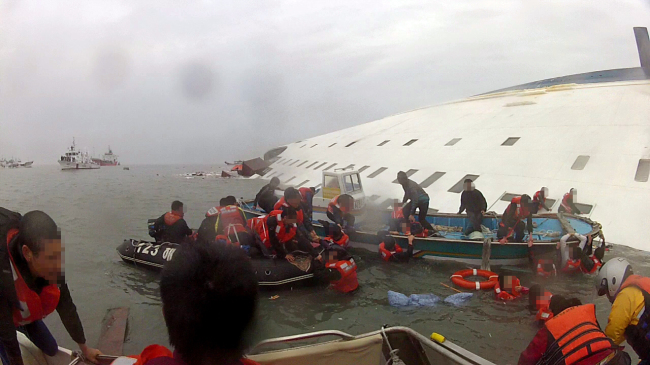Ever since the Sewol ferry disaster, Song Eun-jin, a 56-year-old business woman, sometimes bursts into tears when she watches the news of the rising death toll and grieving relatives of the victims.
Though she is not related to victims or their families and friends, she can’t take her eyes off the news on her smartphone or TV, whether at work or at home.
“My husband asked me to stop watching TV, but how can I not see it? Hundreds of innocent students are dead,” said Song.
Song is one of a growing number of Koreans who feel increasingly depressed since the ferry Sewol sank off the southern coast of the country on April 16, which left more than 300 dead or missing.
Though she is not related to victims or their families and friends, she can’t take her eyes off the news on her smartphone or TV, whether at work or at home.
“My husband asked me to stop watching TV, but how can I not see it? Hundreds of innocent students are dead,” said Song.
Song is one of a growing number of Koreans who feel increasingly depressed since the ferry Sewol sank off the southern coast of the country on April 16, which left more than 300 dead or missing.

In the last two weeks, the number of visitors seeking psychological counseling surpassed 3,900 at a public disaster mental health support center in Ansan, Gyeonggi Province. Of these, 92 percent did not have a direct connection to the accident as either a victim or by acquaintance, the support center said.
The indirect exposure to a disaster may cause acute stress, regardless of the connection with the accident, experts said.
“Even though people were not involved in the ferry accident, they can become greatly traumatized by indirect exposure through media,” said Hwang Jae-uk, a psychiatry professor at Soonchunhyang University Hospital in Seoul.
Many were struck by tremendous helplessness, some doctors said.
“People could do nothing but watch the hundreds drowning in the sinking ferry. The fact that they couldn’t save even one victim made them feel helpless,” said Seoul National Hospital chief Ha Kyoo-seob, who is in charge of the mental health care for relatives of the victims in Ansan.
The emotional distress not only affected the mental health but also the economy, as fewer people opened their wallets.
From April 16-20, credit card use at the five biggest card companies plummeted 7.6 percent from the previous week to 3.5 trillion won ($3.4 billion), according to industry data.
National parks and amusement parks also saw a decline in visitors. In the first weekend after the disaster, the number of visitors to Children’s Grand Park in Seoul fell by almost 40 percent, a park official said.
Lotte World, the largest amusement park in the capital, also saw attendance drop more than 10 percent.
While public depression and anguish continue over the ferry disaster, a period of mourning and grieving is necessary to alleviate the emotional distress, experts said.
“This is part of sympathizing with the victims. This natural feeling should be expressed for better mental health,” said Hwang.
If people become too preoccupied with the ferry stress, they should stop watching the news and find time to relax, he added.
Doctors say those suffering from guilt for failing to protect the young victims should channel that guilt into efforts to prevent similar accidents from reoccurring.
“The role of everyone else is to go back to their daily lives and work on overhauling the safety system. That will be the true consolation for the victims, rather than merely wallowing in emotional distress,” Ha said.
By Lee Hyun-jeong (rene@heraldcorp.com)






![[KH Explains] No more 'Michael' at Kakao Games](http://res.heraldm.com/phpwas/restmb_idxmake.php?idx=644&simg=/content/image/2024/04/28/20240428050183_0.jpg&u=20240428180321)



![[Grace Kao] Hybe vs. Ador: Inspiration, imitation and plagiarism](http://res.heraldm.com/phpwas/restmb_idxmake.php?idx=644&simg=/content/image/2024/04/28/20240428050220_0.jpg&u=)








![[Herald Interview] Xdinary Heroes shoot for the next level with 'Troubleshooting'](http://res.heraldm.com/phpwas/restmb_idxmake.php?idx=642&simg=/content/image/2024/04/29/20240429050745_0.jpg&u=)